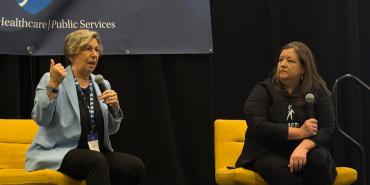The AFT Artificial Intelligence Symposium, held July 24 in Washington, D.C., brimmed with enthusiasm for the myriad ways artificial intelligence can ignite learning, spur creativity and alleviate workloads—and offered a host of warnings about potential harm if educators and unions do not step up to meet this transformative moment.
“There’s serious fear, but there’s also opportunity,” said AFT President Randi Weingarten. “How do we help AI not be the brain, but be the spark for imagination?”
Hundreds of AFT leaders packed the symposium, which was loaded with sessions showcasing the opportunities AI presents for educators: offering classroom data insights, personalizing instruction, supporting students with disabilities and English language learners, and providing tools for educators—including a game designed to teach online research skills. “Our students can’t check sources if they don’t know how to search for the information,” the facilitator noted, explaining how the game creates a maze and offers guided cues that teach students how to navigate online searches—skills that are essential in an era of rampant disinformation and misinformation.
Educators described concrete benefits. A preschool teacher said she can spend more time on the floor with her kids now that AI helps with paperwork. A college instructor reported that adaptive learning tools infused with AI, like speech-to-text and assistive reading technology, transformed her students’ learning experiences.
But concerns loomed large.
Meeting the challenge head-on
Weingarten pointed to social media’s deleterious impact to illustrate the potential harms of technology in education, but she stressed that if educators and unions get involved in development and implementation now, they can shape AI’s application in education to be beneficial.
“We have to meet this challenge head-on, or it will steamroll our professions and our children,” she said. “We have made this decision to engage and harness AI’s potential so we can protect our kids and enshrine protections for our jobs and intellectual property in our contracts.”
During a panel with Rebecca Damon, chief labor policy officer for the Screen Actors Guild-American Federation of Television and Radio Artists, Weingarten outlined the AFT’s core checklist for developing AI guardrails and curriculum: “Is it safe, ethical and wise?” Damon said at SAG-AFTRA—which leveraged a 118-day strike in 2023 to win 18 pages of contract language protecting their members’ likenesses and images from AI replication—the mantra is “consent, compensation and control.”
A safer, more effective tool
Keeping educators at the center is key to safe, ethical and wise AI development in classrooms, which is why the AFT has partnered with the United Federation of Teachers, Microsoft, OpenAI and Anthropic to launch a first-of-its-kind national AI academy for educators. The goal: equip teachers with the knowledge and training to harness AI responsibly and effectively.
“Are we developing AI to make people’s lives and jobs better? If the answer is no, we’re doing it wrong,” said Microsoft executive Gerry Petrella during a panel with Weingarten and James Hairston of OpenAI. “We’re not doing our jobs at Microsoft if we’re not listening to you.”
The takeaways from the symposium were clear: prioritize safe development, seize AI’s innovative potential and act with urgency.
“Don’t wait,” Damon said. “AI isn’t waiting on us.”
[Melanie Boyer]

